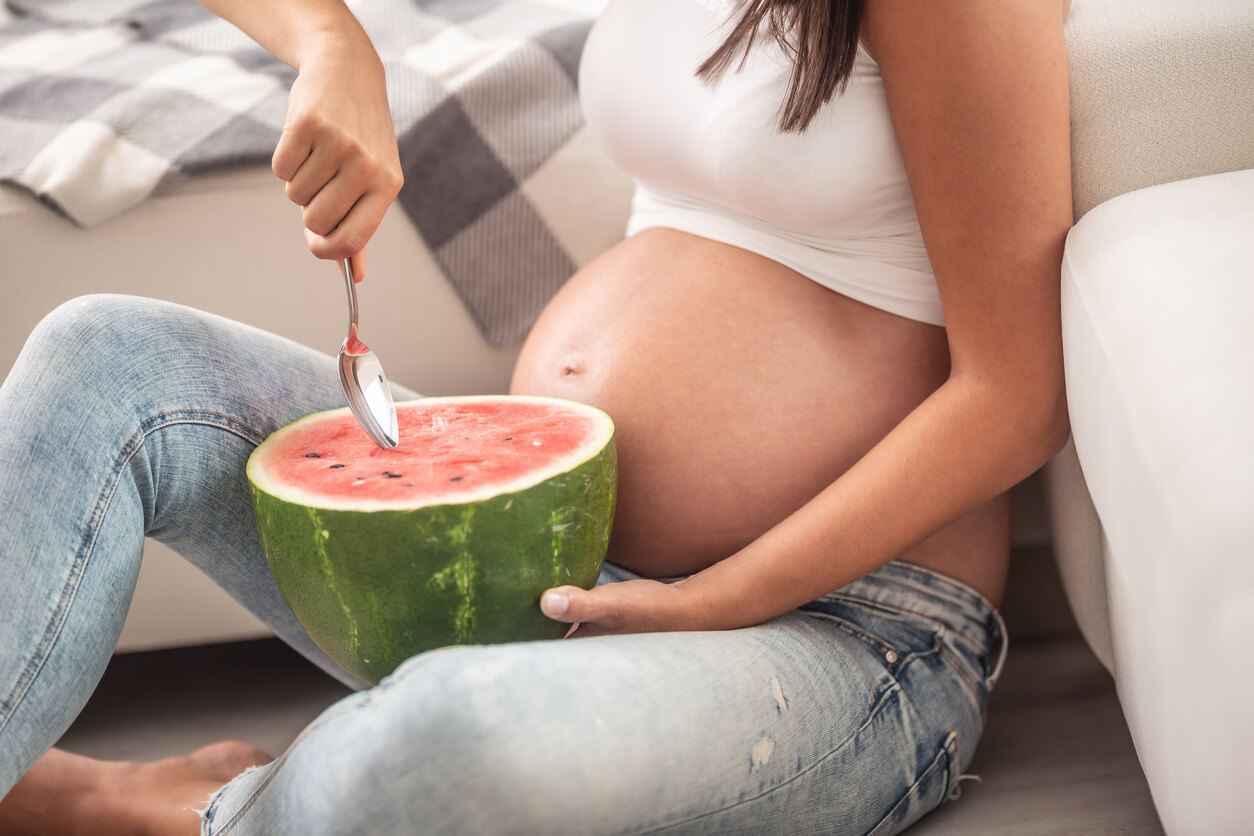Is It Safe to Eat Watermelon During Pregnancy?


Written and verified by the nutritionist Saúl Sánchez Arias
Watermelon is a summer fruit loaded with benefits. Thanks to the food industry, it can be consumed at any time of the year, as there are modified plantations that produce this fruit under suboptimal temperature conditions. However, we’re going to tell you if you can eat watermelon during pregnancy or if it’s a food that should be avoided.
First, we must emphasize that, in general, the consumption of fruits and vegetables is associated with a better state of health. In fact, experts generally recommend eating 5 servings of vegetables every day to reduce mortality for any cause in the medium and long term. The nutrients and antioxidants contained in these foods are crucial for the body.
Should you eat watermelon during pregnancy?
During pregnancy, the body undergoes many changes. The requirements of certain nutrients increase and care must be taken with the inclusion of some foods in the diet, as they could be harmful to the baby. But this isn’t the case with watermelon. This fruit is considered beneficial in almost any circumstance, due to the fact that it contains large amounts of liquids and antioxidants.
In fact, many of the elements found inside the watermelon contribute to improving the development of the fetus or the mother’s state of health. Some of them are the following:
- Iron: This nutrient has been shown to be decisive in ensuring a good supply of oxygen to the tissues and in preventing anemia. This is indicated by a study published in the journal The Medical Clinics of North America.
- Vitamin C: Stimulates immune function, increases iron absorption at the intestinal level and improves endogenous collagen synthesis, which ensures the good health of the body’s tissues.
- Folic acid: The requirements of this nutrient are increased during pregnancy. In fact, if it’s not met, it increases the risk of the baby developing problems related to the central nervous system. It’s normal to take supplements to reduce the incidence of these problems.

Fluid intake during pregnancy
Another key point to keep in mind during gestation is the need to maintain water balance. For this, watermelon can also help, since it is one of the fruits with the highest amount of liquid inside. For this reason, its introduction into the diet during hot periods is very appropriate.
It’s important to note that dehydration could endanger the life of the fetus, as well as the mother’s health. Therefore, not only should fluid intake through beverages be maximized, but foods with a significant fluid content should also be included in the diet. The aim is always to compensate for losses through urine and sweat.
What happens if you eat too much watermelon during pregnancy?
As is almost always the case, the virtue lies in the middle ground. Eating watermelon during pregnancy is positive, but eating too much of it could negatively affect metabolic health, especially if you’ve developed gestational diabetes. It’s a food that contains simple sugars, so its presence in the diet has to be moderate.
It’s true that watermelon provides fiber and modulates the absorption of short-chain carbohydrates, but even so, this may not be enough. It’s best to combine this fruit with others such as apple or pear, which have a lower glycemic index. This ensures a good supply of vitamins and antioxidants.

Watermelon can be consumed during pregnancy
According to what we’ve said in the above article, the inclusion of watermelon in the diet during pregnancy is positive. But keep in mind that it should always be consumed in moderate amounts. This fruit helps to improve hydration and contains valuable antioxidants and vitamins.
Of course, remember that one of the keys to a healthy diet is variety. In this regard, it’s crucial to include a wide range of fruits in the diet to achieve an optimal micronutrient intake. Avoiding deficits will reduce the incidence of developmental problems in the fetus.
Watermelon is a summer fruit loaded with benefits. Thanks to the food industry, it can be consumed at any time of the year, as there are modified plantations that produce this fruit under suboptimal temperature conditions. However, we’re going to tell you if you can eat watermelon during pregnancy or if it’s a food that should be avoided.
First, we must emphasize that, in general, the consumption of fruits and vegetables is associated with a better state of health. In fact, experts generally recommend eating 5 servings of vegetables every day to reduce mortality for any cause in the medium and long term. The nutrients and antioxidants contained in these foods are crucial for the body.
Should you eat watermelon during pregnancy?
During pregnancy, the body undergoes many changes. The requirements of certain nutrients increase and care must be taken with the inclusion of some foods in the diet, as they could be harmful to the baby. But this isn’t the case with watermelon. This fruit is considered beneficial in almost any circumstance, due to the fact that it contains large amounts of liquids and antioxidants.
In fact, many of the elements found inside the watermelon contribute to improving the development of the fetus or the mother’s state of health. Some of them are the following:
- Iron: This nutrient has been shown to be decisive in ensuring a good supply of oxygen to the tissues and in preventing anemia. This is indicated by a study published in the journal The Medical Clinics of North America.
- Vitamin C: Stimulates immune function, increases iron absorption at the intestinal level and improves endogenous collagen synthesis, which ensures the good health of the body’s tissues.
- Folic acid: The requirements of this nutrient are increased during pregnancy. In fact, if it’s not met, it increases the risk of the baby developing problems related to the central nervous system. It’s normal to take supplements to reduce the incidence of these problems.

Fluid intake during pregnancy
Another key point to keep in mind during gestation is the need to maintain water balance. For this, watermelon can also help, since it is one of the fruits with the highest amount of liquid inside. For this reason, its introduction into the diet during hot periods is very appropriate.
It’s important to note that dehydration could endanger the life of the fetus, as well as the mother’s health. Therefore, not only should fluid intake through beverages be maximized, but foods with a significant fluid content should also be included in the diet. The aim is always to compensate for losses through urine and sweat.
What happens if you eat too much watermelon during pregnancy?
As is almost always the case, the virtue lies in the middle ground. Eating watermelon during pregnancy is positive, but eating too much of it could negatively affect metabolic health, especially if you’ve developed gestational diabetes. It’s a food that contains simple sugars, so its presence in the diet has to be moderate.
It’s true that watermelon provides fiber and modulates the absorption of short-chain carbohydrates, but even so, this may not be enough. It’s best to combine this fruit with others such as apple or pear, which have a lower glycemic index. This ensures a good supply of vitamins and antioxidants.

Watermelon can be consumed during pregnancy
According to what we’ve said in the above article, the inclusion of watermelon in the diet during pregnancy is positive. But keep in mind that it should always be consumed in moderate amounts. This fruit helps to improve hydration and contains valuable antioxidants and vitamins.
Of course, remember that one of the keys to a healthy diet is variety. In this regard, it’s crucial to include a wide range of fruits in the diet to achieve an optimal micronutrient intake. Avoiding deficits will reduce the incidence of developmental problems in the fetus.
All cited sources were thoroughly reviewed by our team to ensure their quality, reliability, currency, and validity. The bibliography of this article was considered reliable and of academic or scientific accuracy.
- DeLoughery T. G. (2017). Iron Deficiency Anemia. The Medical clinics of North America, 101(2), 319–332. https://doi.org/10.1016/j.mcna.2016.09.004
- Carr, A. C., & Maggini, S. (2017). Vitamin C and Immune Function. Nutrients, 9(11), 1211. https://doi.org/10.3390/nu9111211
This text is provided for informational purposes only and does not replace consultation with a professional. If in doubt, consult your specialist.








